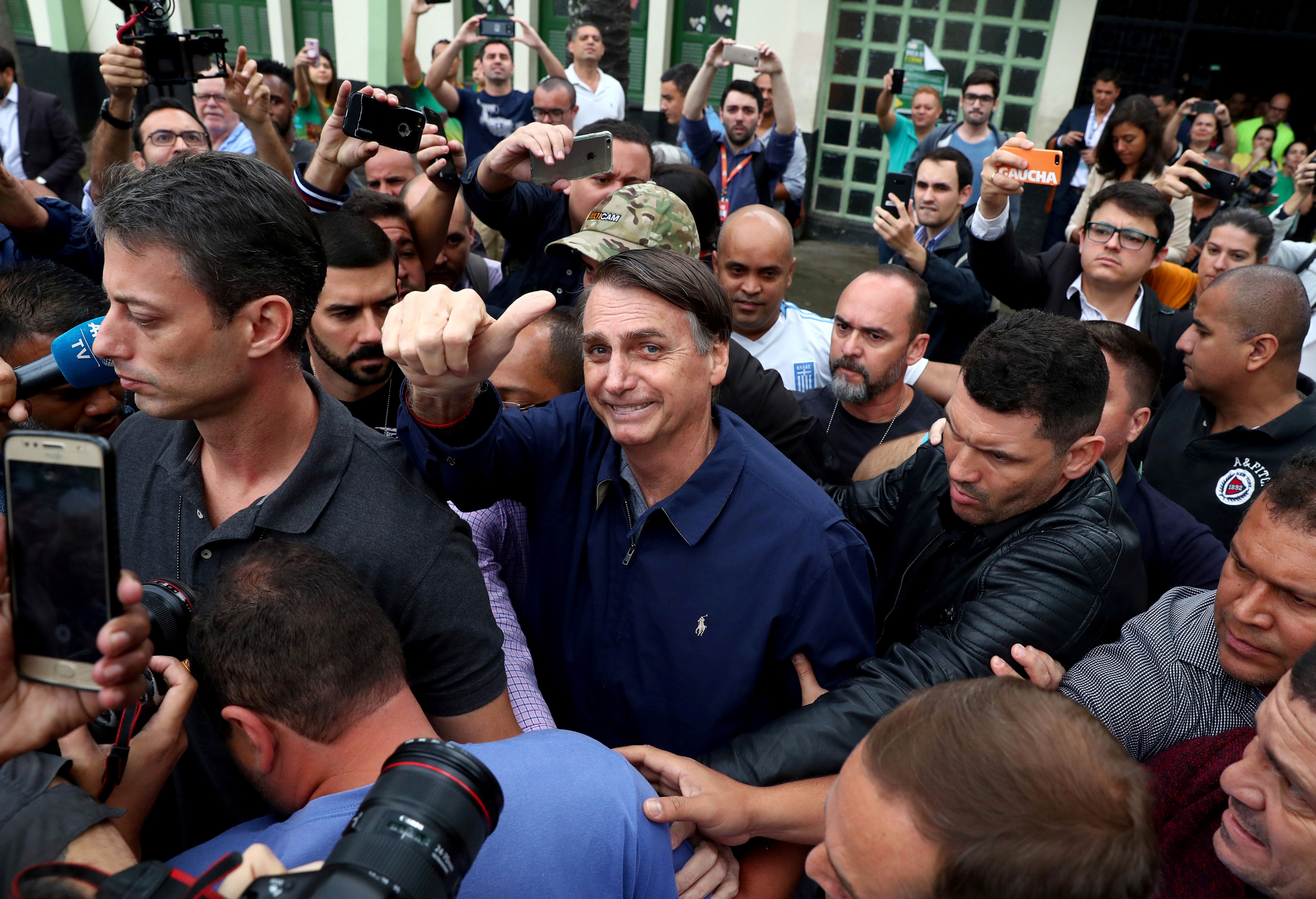October 09, 2018
As expected, Jair Bolsonaro and Fernando Haddad have advanced to the second round of Brazil’s presidential election, which will be held on October 28. There were two surprises. First, with 46 percent of the vote, the surging Bolsonaro nearly won without the need for a runoff. Second, in the country’s congressional elections, a populist wave has lifted his once-obscure Social Liberal Party (PSL) to new heights.
Bolsonaro, a controversial law-and-order candidate, will probably win the head-to-head matchup with Haddad later this month, but his extreme unpopularity with voters on the left will help Haddad make it closer than the first-round margin might suggest.
The bottom line: Another set of voters has demanded dramatic change. Just as establishment figures in the United States, France, Germany, Italy, Mexico, Pakistan, and Sweden have lost significant ground to fresh faces and new parties over the past two years, Brazilians have sent familiar presidential candidates, incumbent governors, and long-time lawmakers packing.
It’s clear that the worst recession in the country’s history, its largest-ever public corruption scandal, and one of the world’s highest murder rates have taken a heavy toll on the country’s political elite. Bolsonaro appears to be the beneficiary, and his likely victory on October 28 will shift the country’s government further from the emphasis on poverty alleviation and inclusion of the Workers Party governments of the past toward a focus on conservative social values and an increasingly tough-minded (sometimes brutal) approach to law enforcement.
Now for the catch: Change costs money, and the new president, probably Bolsonaro, won’t have much to work with. About two-thirds of Brazil’s federal budget is automatically directed toward payment of pensions, public health care, and the salaries of government workers. If more money is to go toward badly needed investment in the country’s tumble-down infrastructure or to help police restore order in the country’s largest cities, entitlement reform is crucial. That means building a political coalition to change the country’s constitution.
Bolsonaro’s party will increase the number of its seats from 8 to 52 in Brazil’s 513-member lower house of Congress, but unless the tough-talking new chief executive is willing to cut deals with a large number of lawmakers in a large number of different political parties, and fight to prevent the legislative watering down of painful spending reforms—and unless a new president despised by a significant number of citizens can persuade them that austerity is necessary, some of Brazil’s biggest problems won’t be addressed.
More For You
French President Emmanuel Macron, German Chancellor Friedrich Merz, Ukrainian President Volodymyr Zelenskiy, U.S. Special Envoy Steve Witkoff and businessman Jared Kushner, along with NATO Secretary-General Mark Rutte and otherEuropean leaders, pose for a group photo at the Chancellery in Berlin, Germany, December 15, 2025.
Kay Nietfeld/Pool via REUTERS
The European Union just pulled off something that, a year ago, seemed politically impossible: it froze $247 billion in Russian central bank assets indefinitely, stripping the Kremlin of one of its most reliable pressure points.
Most Popular
Sponsored posts
Consumers are spending–just not evenly
What's Good Wednesdays
What’s Good Wednesdays™, December 17, 2025 – holiday movie edition
Walmart’s $350 billion commitment to American manufacturing means two-thirds of the products we buy come straight from our backyard to yours. From New Jersey hot sauce to grills made in Tennessee, Walmart is stocking the shelves with products rooted in local communities. The impact? Over 750,000 American jobs - putting more people to work and keeping communities strong. Learn more here.
Of all the threats to the world, what are the top 10 most urgent global risks for 2026? On Monday, January 5, at 12 pm ET, join us for a livestream discussion with Ian Bremmer and global experts to discuss the Top Risks of 2025 report from Eurasia Group. This report will mark twenty years of Ian Bremmer’s annual forecast of the political risks that are most likely to play out over the year. Event link: gzeromedia.com/toprisks
In this episode of Tools and Weapons, Microsoft Vice Chair and President Brad Smith sits down with Ed Policy, President and CEO of the Green Bay Packers, to discuss how purpose-driven leadership and innovation are shaping the future of one of the world’s most iconic sports franchises. Ed shares how technology and community-focused initiatives, from Titletown Tech to health and safety innovations on the field, are transforming not just the game of football, but the economy and culture of Green Bay itself. He explains how combining strategic vision with investment in local startups is keeping talent in the Midwest and creating opportunities that extend far beyond Lambeau Field.
Subscribe and find new episodes monthly, wherever you listen to podcasts.
© 2025 GZERO Media. All Rights Reserved | A Eurasia Group media company.
